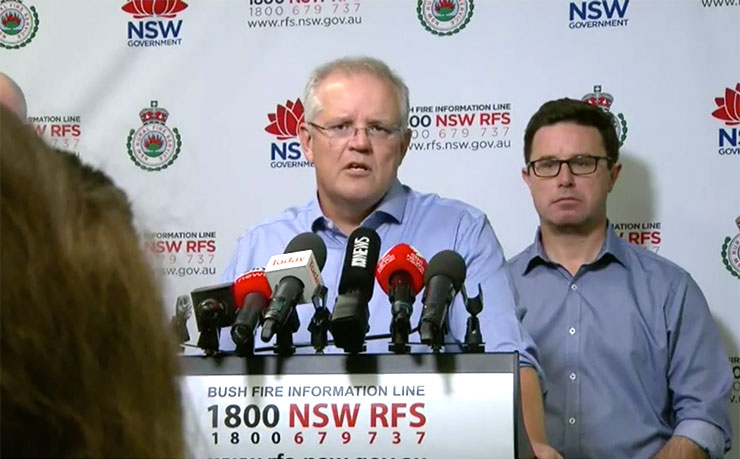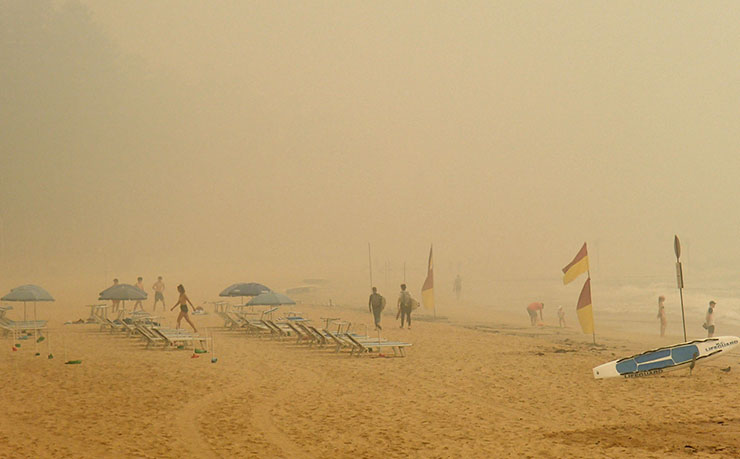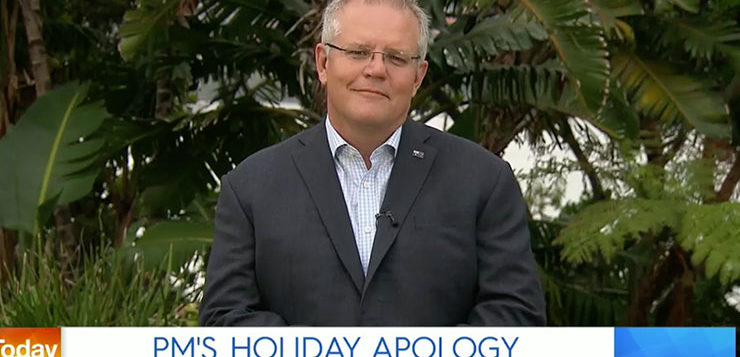DON’T MISS ANYTHING! ONE CLICK TO GET NEW MATILDA DELIVERED DIRECT TO YOUR INBOX, FREE!
Like Morrison, like Trump writes Darren Lewin-Hill.
Like many Australians, I found myself railing against the secret desertion of Scott Morrison to Hawaii during a national bushfire crisis that rages even as I write.
There were – and are – many elements to this outrage. There was the shrouding of the prime minister’s whereabouts by his staffers as communities burned, and cities themselves were shrouded in choking smoke.
There was the failure to acknowledge that – regardless of how the fires started – climate change has set the conditions for the scale and intensity of their catastrophic burning.
And, of course, there’s the reality that, while denying the link between climate change and these specific fires, the Morrison Government pursues policies that are entirely consistent with delivering more fires just as destructive, or even worse.
And that was before public outcry forced Morrison’s return, and a series of responses that revealed a will to manage public perceptions, rather than to answer a deadly bushfire challenge with a climate plan consistent with mitigating future risk.

First there was the contradiction of acting prime minister, Michael McCormack, in Morrison’s bull-headed assertion there would be no change to climate policy. Then there was the continuing resistance to better support for the men and women fighting the fires – some on the fire ground 20 hours or more at a stretch, or running out of water as they fought.
Perhaps most tellingly, however, there was the continuation of a past communication strategy that signalled a sustained evasion of the issues, and an intention to undermine Australians with an understandable response of horror to the fires.
For Morrison said he understood the ‘anxiety’ he had created through his absence. In doing so, he continued the insinuation he earlier began in his attack on Greta Thunberg, whom he associated with ‘needless anxieties’ in children over the threat posed by climate change. The implication is that the anxiety Morrison speaks of arises from exaggerated and baseless fear, not the climate reality before us.
Then came the interview on Seven’s Sunrise program, where Morrison was quite strongly challenged on his absence and lack of leadership at a time of deep national crisis.
His self-comparison with a plumber choosing not to take a Friday afternoon job so he could pick up the kids was of course a galling false analogy, but it was just the beginning of a flailing and disingenuous performance.
That Morrison would refer to the firefighters who had died, and to their families, by their first names – insinuating a familiarity and sympathy he thought would work in his favour – signalled not a human response, but an orchestrated ploy.

Then there was the reference to the climate ‘panic’ he maintained would be reflected in a change of policy. Those distressed by the destruction of the fires and the yawning gap between his policies and a science-based plan with a chance of reducing future infernos were, presumably, needlessly beside themselves with a panic verging on the irrational. This was clearly a cynical replay of Morrison’s Thunberg line.
Through all of this, in its virtualised, insubstantial way, social media ignited. Hundreds of thousands of tweets and posts appeared, only to be pushed down our feeds and buried by others. Outrage buried by outrage, as the real fires continued to burn, joining in vast mega-fires creating their own weather systems.
In my own exasperated railing, I pondered our lack of democratic mechanisms to intervene in a timely way to address the urgency of our situation. Failing some drastic and unlikely mutiny of Coalition MPs there seemed no way that Morrison could be corrected or stopped before accumulating years of perhaps irreversible climate damage all the way to the next election.
Despite the social media storm, I was also struck by the underlying silence of so many people, wondering whether this was indeed an expression of the so-called ‘quiet Australians’ who I feared would say nothing no matter what outrage might be committed by a prime minister. Plumbing this darkness, I considered whether we are a nation quiet even to ourselves.
A Twitter response to these musings reflected that even in the United States, where democratic mechanisms for removal do exist, nothing changes. It was, of course, a reference to the impeachment of Donald Trump.
While it’s true Trump is unlikely to be removed, the two votes of Congress offered a glimmer of hope, moments of accountability in the eyes of a nation that spoke of a will to uphold the truth.
Though we cannot yet stop Scott Morrison, I can’t help but feel these fires and his abdication of responsibility for stopping them may have brought the closest thing we have to his impeachment moment.
BE PART OF THE SOLUTION: WE NEED YOUR HELP TO KEEP NEW MATILDA ALIVE. Click here to chip in through Paypal, or you can click here to access our GoFundMe campaign.
Donate To New Matilda
New Matilda is a small, independent media outlet. We survive through reader contributions, and never losing a lawsuit. If you got something from this article, giving something back helps us to continue speaking truth to power. Every little bit counts.




